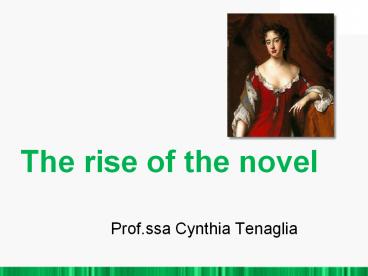The rise of the novel - PowerPoint PPT Presentation
1 / 13
Title:
The rise of the novel
Description:
The rise of the novel Prof.ssa Cynthia Tenaglia WHY NOVEL? From Novelty Individual vision of Reality. Truth is an individual experience ,always unique and new REALISM ... – PowerPoint PPT presentation
Number of Views:480
Avg rating:3.0/5.0
Title: The rise of the novel
1
The rise of the novel
- Prof.ssa Cynthia Tenaglia
2
WHY NOVEL?
- From Novelty
- Individual vision of Reality.
- Truth is an individual experience ,always unique
and new
3
REALISM
- It tries to portray all the varieties of human
experience - Descartes and Locke insisted upon the importance
of individual experience. - They believed that reality could be discovered by
the individual through the senses
4
The rise of the novel
- The increase of the reading public in the
Augustan Age was due to
the growing importance of the middle class
the individuals trust in his own abilities
- Coffee
- Houses
- Journals
the practice of reason and self-analysis
Most readers were middle-class women
They used to borrow books from circulating
libraries
5
The rise of periodical essays
- they had a great influence on the novel.
- In the first 15 years of the 18th c. writers as
Steele and Addison included many
character-sketches in their essays, as well as
descriptions and discussions of the social scene.
In their sketches they mixed descriptions and
narrative with the kind of witty dialogue and
sense of drama that had characterized the
Restoration Comedies.
6
The novelist
- The spokesman of the middle class.
- The fathers of the English novel
- Daniel Defoe ? the realistic novel
- Samuel Richardson ? the sentimental novel
- Henry Fielding ? the mock-epic novel
- Jonathan Swift ? the satirical novel
7
The novelists aim
- To be understood widely ? he wrote in a simple
polished and elegant way.
- Realism ? not only linked to the life presented,
but to the way it was shown.
- Speed and copiousness ? his most important
economic virtues since it was the bookseller and
not the patron who rewarded him.
8
The Plot
- the social structures of everyday life
9
Themes
- Real life
- Everything that could affect social status
- The sense of reward and punishment ? linked to
the Puritan ethics of the middle class
10
The characters
Is a particular human type , no more a general
human type
The Hero
A bourgeois, self-made, self-reliant man
The mouthpiece of the author
The reader is expected to sympathise with him
All the characters
- have contemporary names and surnames
- located precisely in time and space.
- struggle for survival or social success
- believe in reason
11
TIME
- No more timeless stories to mirror the unchanging
moral verities - Precise time
- No more restriction in the time of tragedy to 24
hours ( the celebrated UNITY OF TIME) - PAST EXPERIENCES ARE THE CAUSE OF PRESENT ACTIONS
12
The setting
- Detailed descriptions of interiors ? to make the
narrative more realistic
- Chronological sequence of events
- References to particular times of the year or of
the day - I was born in the year 1632, in the
city of York - (Robinson Crusoe)
- Specific names of towns and streets
13
The narrative technique
1ST-PERSON NARRATOR 3RD-PERSON NARRATOR PATTERN
Daniel Defoe Jonathan Swift Fictional autobiographies
Samuel Richardson Letters exchanged between the main characters
Henry Fielding The mock-epic style






![download⚡️[EBOOK]❤️ The Seven Husbands of Evelyn Hugo: A Novel PowerPoint PPT Presentation](https://s3.amazonaws.com/images.powershow.com/10134131.th0.jpg?_=20240920034)
![download⚡️[EBOOK]❤️ The Seven Husbands of Evelyn Hugo: A Novel PowerPoint PPT Presentation](https://s3.amazonaws.com/images.powershow.com/10136105.th0.jpg?_=202409231210)
![download⚡️[EBOOK]❤️ The Seven Husbands of Evelyn Hugo: A Novel PowerPoint PPT Presentation](https://s3.amazonaws.com/images.powershow.com/10132141.th0.jpg?_=202409170910)
![❤[PDF]⚡ Caledonian Road: A Novel PowerPoint PPT Presentation](https://s3.amazonaws.com/images.powershow.com/10072893.th0.jpg?_=202407041011)





















